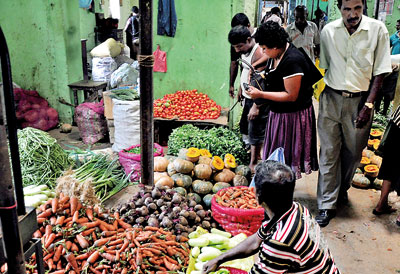| The increase in the price of fuel is having a spiralling effect on the cost of living. Both consumers and businesses are feeling the pinch, and taking action to cut costs.
While grocery and food items have gone up in price, milk powder and gas prices remain the same, but are expected to go up.
One company is suffering from a double blow under the price increase. Maliban Milk Products general manager D. L. Weerasuriya told the Sunday Times that the biscuit manufacturer’s production costs have gone up on two fronts.
“The increase in the electricity surcharge has affected the final production cost, and because we use a diesel generator too, we feel the impact from the fuel cost increase. On top of that, our islandwide transport expenses have also gone up.”
 |
| A good harvest has seen vegetable prices remaining the same. Pix by Mangala Weerasekera |
Mr. Weerasuriya said he had had discussions with the Consumer Protection Authority on Friday, and it was explained to him that the dollar difference had had a strong impact on milk powder imports. Maliban is selling biscuits at Rs. 37 below cost, Mr. Weerasuriya said. A kilo of milk powder is expected to go up from Rs. 660 to Rs.697. If that happens, Maliban will be forced to slap on another Rs. 15 to a 400-gram packet of biscuits. “The delay means that all milk powder companies are losing. We hope the Consumer Protection Authority will decide soon,” he said.
Susil S. Sirisena, Secretary to the Ministry of Co-operatives and Internal Trade, told the Sunday Times that the ministry is mulling milk powder and gas prices before making a decision. “The price committee is evaluating the situation,” Mr. Sirisena said. “World market prices do not reflect an increase in milk powder prices, but milk powder companies are demanding a massive increase. Let’s wait and see what the price committee has to say.”
Meanwhile, grocery items have gone up by between Rs. 5 and Rs. 10. One kilo of onions has gone from Rs. 50 to Rs. 60, potatoes from Rs. 50 to Rs. 65, and garlic from Rs. 75 to Rs.80.
Bread too costs more. The Bakery Owners’ Association confirmed that a loaf of bread went up by Rs. 5 at midnight on Friday. Restaurant owners say lunch packets and food items like hoppers and paratas will go up if the price of gas goes up.
So far, rice and vegetable prices remain the same, largely because of a good harvest.
Pettah vegetable seller Mr. Kasun said vegetable cultivation is flourishing and vegetables are available in abundance. “Leeks and carrots are coming down in price because production is high in hills,” he said.
Vegetable vendor Saman Munaweera, who deals largely in potatoes, said large quantities of potatoes are arriving from Jaffna and the hill country, while chena cultivation is further boosting vegetable production.
The Ceylon Teachers’ Union is to call for a protest by all unions, in the public and private sector, on Wednesday.
“The government readily spends on propaganda exercises like the Dayata Kirula exhibition and the Southern Expressway,” said Ceylon Teachers’ Union president Joseph Stalin. “That’s where the country’s money is going. The government has raised fuel prices to offset excessive spending on luxuries. The budget gives low priority to salary increments for public sector employees.
“All these days the war was the excuse for the high cost of living. Now the war is over, but nothing has changed. And when we go on strike and protest over the cost of living, we are stifled.”
Health Sector Trade Union Alliance president Saman Ratnapriya told the Sunday Times that the price hike has had a negative impact on public sector employees, whose basic salary is Rs. 11,730.
“We face serious economic problems because of the high cost of living,” he said. “Health sector employees have not been given a reasonable salary increment.”
Mr. Ratnapriya said the government should either reduce fuel prices or give public sector employees a transport allowance of Rs. 5,000.
Railway Service Trade Union Alliance convenor Sampath Rajitha said a large number of railway employees depended on bus transport, and they too were entitled to a transport allowance.
Free Trade Zone and General Services Employees Union joint secretary Anton Marcus said workers should be given a budgetary relief allowance of Rs. 5,000. “The majority of free trade zone workers come from distant areas and live in boarding houses. They use kerosene to cook their meals,” he said.
Lanka Jathika Estate Workers’ Union general secretary K. Velayutham told the Sunday Times that 30 per cent of estate workers do not have electricity. “Even if they do have electrification, they cannot afford to use it. Those who don’t have electricity use kerosene oil for lamps.” |


